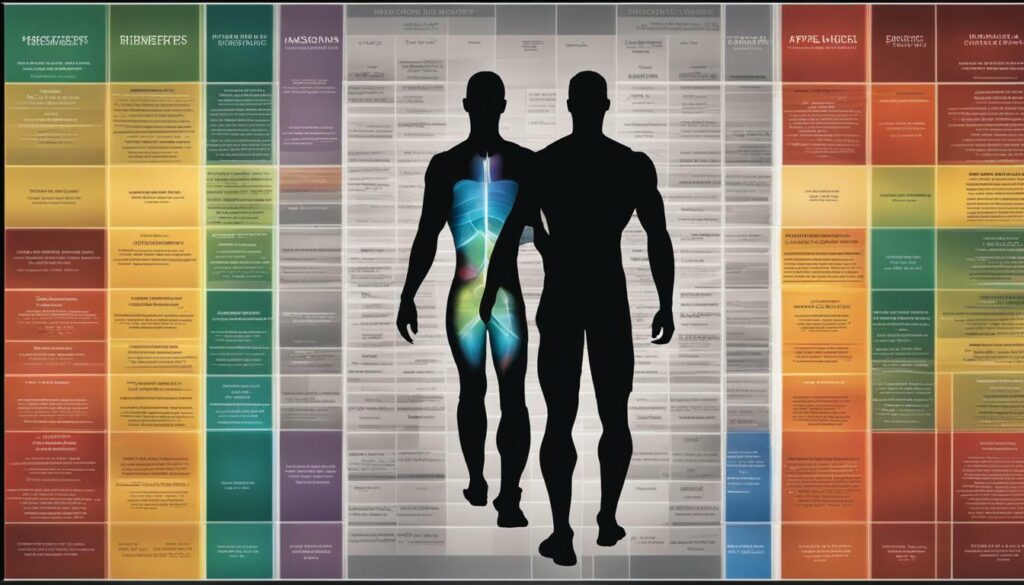Does my Body Type Matter?
Many individuals wonder, “Does my body type matter?” In this section, we will delve into the relationship between body type and self-esteem, as well as the significance of body positivity and acceptance.
The concept of body types, or somatotypes, suggests that individuals fall into three categories: ectomorph, mesomorph, and endomorph. Proponents of this theory argue that body type can provide clues about metabolism, hormone function, and nutritional needs. However, there is limited scientific evidence to support these claims.
While body type may influence factors such as weight distribution and muscle mass, it should not dictate an individual’s diet or exercise routine. Each person’s body is unique and should be approached with personalized goals and strategies. Ultimately, the key to achieving health and fitness goals lies in consistency, hard work, and a focus on proper nutrition and exercise.
Key Takeaways:
- Body type alone should not determine an individual’s self-esteem or worth.
- Promoting body positivity and acceptance is crucial for maintaining a healthy body image.
- There is limited scientific evidence to support the idea that body type affects metabolism, hormone function, and nutritional needs.
- Each person’s body is unique and should be treated with personalized goals and strategies.
- Consistency, hard work, and a focus on proper nutrition and exercise are key to achieving health and fitness goals.
The Influence of Body Type on Health
When it comes to health, some argue that body type can provide insights into factors such as metabolism, hormone function, and nutritional needs. In this section, we will explore the potential connections between body type and overall well-being.
Factual data: The concept of body types, or somatotypes, suggests that individuals fall into three categories: ectomorph, mesomorph, and endomorph. Proponents of this theory argue that body type can provide clues about metabolism, hormone function, and nutritional needs. However, there is limited scientific evidence to support these claims.
While body type may influence factors such as weight distribution and muscle mass, it should not dictate an individual’s diet or exercise routine. Each person’s body is unique and should be approached with personalized goals and strategies. Ultimately, the key to achieving health and fitness goals lies in consistency, hard work, and a focus on proper nutrition and exercise.
Body Type and Health: Debunking the Myths
There is a widespread belief that certain body types are more prone to specific health issues or have an advantage in certain sports or activities. However, research indicates that body type alone is not a reliable predictor of an individual’s health or athletic capabilities. While genetics do play a role in determining our body type, lifestyle factors such as diet, exercise, and overall well-being have a more significant impact on our health outcomes.
To debunk the myths surrounding body type and health, it is essential to understand that a person’s health is determined by a combination of factors, including genetics, lifestyle choices, and environment. It is not solely determined by the body type they possess. Therefore, it is crucial to focus on overall health and well-being rather than obsessing over body type classifications.
| Body Type | Characteristics | Health Considerations |
|---|---|---|
| Ectomorph | Lean, thin, and difficulty gaining weight or muscle | May have a faster metabolism but can still face health challenges like nutrient deficiencies |
| Mesomorph | Well-built with a muscular physique | May have a more efficient metabolism, but still need to prioritize a balanced diet and exercise for optimal health |
| Endomorph | Naturally bigger, with higher body fat levels | May have a slower metabolism, but can still achieve good health through regular physical activity and a mindful approach to nutrition |
It’s important to note that body type classifications are generalizations, and individuals often exhibit features of multiple types or fall outside these categories. The best approach to achieving optimal health is to focus on nourishing the body with a balanced diet, engaging in regular physical activity, and prioritizing mental and emotional well-being.

Challenging Body Type Stereotypes
In recent years, a powerful body positivity movement has emerged, aiming to challenge societal beauty standards and promote self-acceptance. In this section, we will discuss the significance of embracing different body types and the importance of breaking free from body type stereotypes.
The concept of body types, or somatotypes, suggests that individuals fall into three categories: ectomorph, mesomorph, and endomorph. These categories are often associated with certain physical characteristics and traits. However, it is important to recognize that these classifications are oversimplified and do not capture the complexity and diversity of human bodies. Every body is unique, and placing individuals into rigid categories can perpetuate harmful stereotypes and contribute to body dissatisfaction.
“Our bodies are not meant to fit into preconceived molds or conform to societal expectations. The beauty of the body positivity movement lies in its celebration of diversity and self-acceptance,” says body positivity advocate, Sarah Johnson.
“We need to challenge the notion that there is a ‘perfect’ body type and embrace the beauty in our differences. This movement is about empowering individuals to love and accept themselves, regardless of their body shape or size.”
By challenging body type stereotypes, we can create a more inclusive and accepting society where everyone feels valued and celebrated.
| Benefits of Embracing Different Body Types |
|---|
| 1. Promotes self-acceptance and positive body image |
| 2. Reduces body shaming and stigma |
| 3. Encourages diversity and inclusivity |
Embracing different body types not only benefits individuals, but it also has a positive impact on society as a whole. When we challenge body type stereotypes, we create a culture that celebrates diversity and promotes inclusivity. It allows individuals to feel comfortable and confident in their own skin, leading to improved mental health and well-being.
Conclusion
Breaking free from body type stereotypes is an integral part of the body positivity movement. Embracing different body types and promoting self-acceptance leads to a more inclusive and accepting society. Remember, our bodies are unique and deserve to be celebrated in all their diversity. Let’s challenge societal beauty standards and embrace the beauty in our differences.
Emphasizing Individuality in Health and Fitness
When it comes to health and fitness, it is crucial to recognize that each person’s body is unique. In this section, we will explore the significance of embracing individuality and adopting personalized strategies for achieving health and fitness goals.
While traditional theories of body types suggest that individuals fall into distinct categories such as ectomorph, mesomorph, and endomorph, the scientific evidence to support these claims is limited. While body type may influence factors such as weight distribution and muscle mass, it should not dictate an individual’s diet or exercise routine. Each person’s body is complex, influenced by a multitude of genetic and environmental factors, and should be approached as such.
Focusing solely on body type can lead to a one-size-fits-all approach to health and fitness, which may not yield optimal results. Instead, it is essential to embrace the uniqueness of our bodies and develop personalized strategies tailored to our specific needs and goals. This means recognizing our individual strengths, weaknesses, and preferences.
Personalization extends beyond diet and exercise. It also includes considering factors such as mental well-being, sleep patterns, and stress levels. Listening to our bodies and making adjustments accordingly is key. It’s about finding a sustainable and enjoyable approach to health and fitness that works for us as individuals.
| Benefits of Embracing Individuality in Health and Fitness: |
|---|
| 1. Improved motivation and adherence to a healthy lifestyle. |
| 2. Enhanced physical and mental well-being. |
| 3. Increased self-acceptance and body confidence. |
| 4. Improved ability to set and achieve realistic goals. |
By embracing individuality in health and fitness, we empower ourselves to take control of our well-being. It is through understanding and appreciating our unique bodies that we can develop sustainable habits and achieve long-term success.

In conclusion, while body type may have some influence on aspects such as weight distribution and muscle mass, it should not dictate an individual’s self-esteem, body image acceptance, or their approach to health and fitness. Embracing body diversity, promoting body acceptance, and recognizing the uniqueness of each person’s body are paramount in achieving overall well-being.
The concept of body types, or somatotypes, suggests that individuals fall into three categories: ectomorph, mesomorph, and endomorph. Proponents of this theory argue that body type can provide clues about metabolism, hormone function, and nutritional needs. However, it is important to note that there is limited scientific evidence to support these claims.
While body type may influence factors such as weight distribution and muscle mass, it should not dictate an individual’s diet or exercise routine. Each person’s body is unique and should be approached with personalized goals and strategies. Instead of relying solely on body type, the key to achieving health and fitness goals lies in consistency, hard work, and a focus on proper nutrition and exercise.
By embracing body diversity and promoting body acceptance, we can create a more inclusive and supportive environment where individuals of all body types feel valued and confident. Recognizing the limitations of body type theories and emphasizing the importance of individuality in health and fitness can help us move towards a more holistic approach towards well-being.
FAQ
Does my Body Type Matter?
The concept of body types may impact self-esteem and body image acceptance, promoting body positivity and embracing different body types.
What is the Influence of Body Type on Health?
Body type may potentially influence metabolism, hormone function, and nutritional needs. Embracing body diversity and accepting all body types is important.
How Can I Challenge Body Type Stereotypes?
Challenging body type stereotypes and embracing the body positivity movement is crucial. Self-acceptance and embracing different body types are essential.
How Can I Emphasize Individuality in Health and Fitness?
Recognizing and celebrating individuality in health and fitness is important. Personalized approaches to diet and exercise, beyond body type, are key.
What is the Conclusion?
The article emphasizes the importance of body acceptance, diversity, and the limitations of relying solely on body type for health and well-being.






